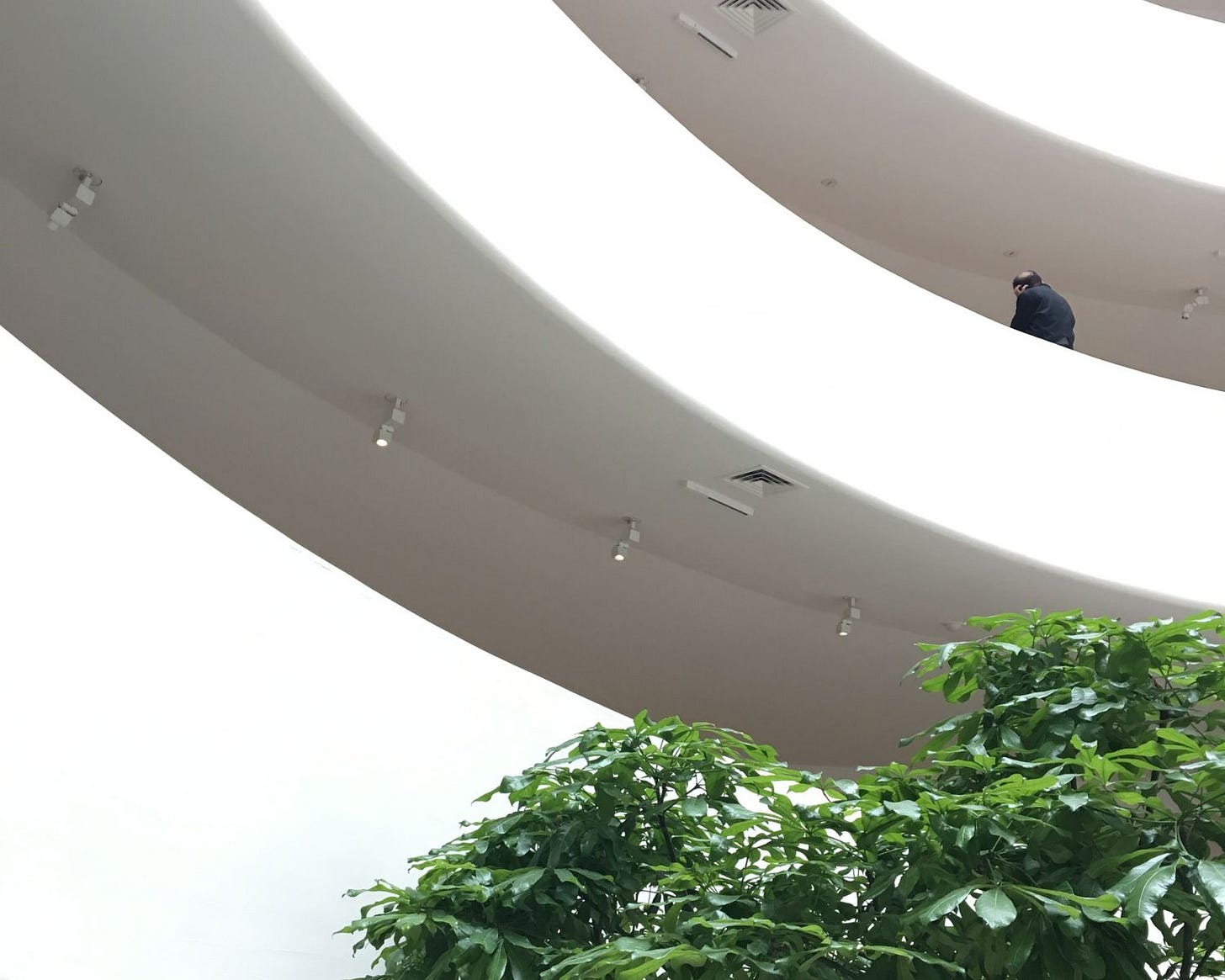(This voiceover is an audio version of the newsletter below. As always, it’s unedited and today you might hear the rain and our kids playing and lots of word stumbles. If you like/need to listen to these posts I hope you enjoy it!)
Welcome back to The Tortoise in 2024. I hope you enjoyed the deep-dive into values from earlier this month and that you’re feeling rested and curious about the year ahead. (If you haven’t had a chance to explore it yet, there’s still a couple of weeks left to access the workshop if you’d like to dig into your values a little more.)
We’re still offline for another week or so, but I wanted to drop back into your inbox with some more thoughts on this year’s group experiment.
As you might know, last year I ran the 1% experiment by myself, where I asked what might happen if I committed to tiny, consistent changes over time. And it turns out that while I was wrong about how it looked, the experiment itself was incredibly powerful.
This year I want to make it more structured (not my default position, that’s for sure) and open it up to you, The Tortoise community, to join in. It’s not going to kick off officially for another couple of weeks but I’ll be doing some thinking and (loose) planning over the break, and wanted to share what that looks like in case you’d also like to think about your 1%.
Firstly, I’ve identified a few (probably too many) areas of life I’d like to apply the 1% to this year:
Health
Joy
Creativity
Nature
Life admin
Connection
Meditation
Some are specific practices, while others are broader areas of life. I quite like the idea of having a mix of both. I also know I won’t be doing them all as part of the experiment, but having them in the back of my mind might spur me to make positive changes anyway.
Then, I look at what 1% can mean, in practical terms.
1% of my day is 15 minutes OR 1% of my week is 1.5 hours
I could increase a practice by 1% at a time (eg. If I walk three kilometres a day, adding 1% a day for a month will mean I’m walking almost 4km every day by the end of that month, nearly 5.5km after two months and 7.3km after three.)
Give 1% extra effort in an area of life. Pick up that sock, delete five emails, flatten the cardboard boxes before recycling them, put your phone down when your kids walk in, give your partner a kiss goodnight.
What I’ve learnt over the past 12 months is that tiny efforts still add up. Sometimes quantifiably, other times not. That doesn’t change the fact that they matter.
By the time I come back to my desk in February, I will have decided on what area (or areas) I’ll focus my 1% efforts on in the first term, and will have written a ‘grab and go’ list to help support that.
What do I mean by that?
I know that we start the year full of good intentions and committing to an experiment like this feels awesome in the beginning. But then life starts happening. Work picks back up, schedules get full, and the time we had earmarked for these efforts gets crowded. For me, a huge part of this year’s experiment, and the more structured part of it, will be the grab and go list.
If your 1% area is a consistent practise like 15 minutes of meditation every day, you may not need a list like this, but if you’re looking to work on broader ideas like creativity or connection or pleasure, then you might need a list you can dip in and out of.
For example, if I choose nature as my first area of focus, I might write a list like this, that incorporates 15 minute tasks, as well as tiny 1% efforts:
Sit in the sun for five minutes, noticing the insects, trees, wind.
Go for a walk and pay close attention to the natural neighbourhood. What trees are in the park? What flowers are in bloom? Are there any birds around? What about butterflies, bees or ants?
Water the indoor plants
Look out the window at the sky every hour, and see if the colours change throughout the day
Burn some essential oil (cedar, hinoki, tea tree etc)
Before you cut up the carrots for dinner, spend a minute thinking about how they grow underground, how they are a root, how they’re full of nutrients, how they grew from a tiny seed
Go for a barefoot bushwalk
Leave the earphones behind when you walk the dogs, listening to the sounds around you instead
Pick a bunch of wildflowers and put them on your desk
Watch a video of awe-inspiring nature
Look at photos from one of your hikes/adventures
Listen to nature sounds on Spotify.
It offers tiny, almost insignificant options, and it offers bigger ones for the days when I have time. No matter how big or small the effort, they all count, and I can grab and go as needed.
If you want to join in with the 1% experiment this term, over the next couple of weeks you might like to:
Write a list of areas of life or specific projects or practises you’d like to apply your 1% to. They might be directly related to the values you worked through recently, or they might be related to your word of the year. It doesn’t matter if there’s too many at this stage, just think about where you feel the need for change.
Select one to be your first area of focus
Write a grab and go list of ways you can support those 1% efforts, including both 15-minute options and smaller tasks or tweaks. Google the change you want to make and see what ideas other people have. Get creative and fun and remember that no effort is too small.
If you feel comfortable, share your area of focus and your list in the comments below. I know I find a lot of inspiration in other people’s ideas and would love to see your suggestions on how to tackle your 1%.
In terms of practicalities, the experiment will run to terms, just like my letters, meaning there will be four quarterly experiments. You can choose to focus each quarter on a specific project, habit or area of life, or you can choose to focus your 1% efforts on the same thing for the whole year — it’s totally up to you.
At the beginning of every term, I’ll share the area of life I’m focusing my 1% efforts on, and will invite you to do the same. Then I’ll share my progress each month, either in a letter or via the Chat function here on Substack. (I’m not entirely sure which yet but will let you know in February.)
The first post of each experiment will be free to every reader of The Tortoise, as I’d really like everyone to have access to the ideas and support they will offer. But the accountability side of the experiment will be limited to paying subscribers, mostly to allow us to share our progress in a slightly more protected space.
If you’d like to join as a paying supporter, we’d love to have you and you can sign up here. It’s AU$5/month or $50/year.
If you feel that the accountability element of the experiment would be really helpful to you but you don’t have the financial capacity to pay right now, please send me an email and I’ll set you up with an annual membership for free — no questions asked.
I hope this all makes some semblance of sense to you, and that you’re keen to join in. I’m sure the experiment will evolve over time, but this is the plan to start.
I’m excited to hear your ideas and read your lists, and can’t wait to get started on the 1% experiment together in a couple of weeks.
Until then, take good care and I’ll see you soon.
Brooke xx








My goal is to continue the few small habits I have started this year to help them stick.
1. Each night once I have bathed my 8month old, I give him to my husband for 10-15 min so I can do a quick reset, toys away, dishwasher on, etc. this means once I put my son to bed, the rest of the night is for me and not housework, and the house feels calmer in the morning
2. I am reviewing each email subscription as it comes into my inbox and unsubscribing from most of them
3. I have started a logbook journal like you have discussed previously. I also add all my appts for the week, and then 1-3 things I’d like to achieve (one of yesterday’s goals was have a nap, which I achieved!)
So far these things have given my mind a lot of space, and I actually feel up to tackling some of the bigger jobs around the house, or enjoying just having time for me (this week I crocheted and watched a movie for the first time since my son was born!)
My goal is about general organisational skills & routine, to make life run a little smoother. Our family will have some significant changes this year with our youngest starting school and me returning to FT work with a significant commute.
1. Batching meals on weekends so those days when I'm in the office and have the long commute, I don't have to stress about late dinner, homework etc all at once.
2. Empowering the rest of my family to take on more of the thinking. Everyone is tasked with picking at least one dinner for the following week (and has to help cook it).
3. Meal planning and shopping in advance.
4. Using the commute for practical tasks instead of mindless scrolling.
5. Using WFH days to stay on top of washing
6. Get a cleaner?
You get the idea...